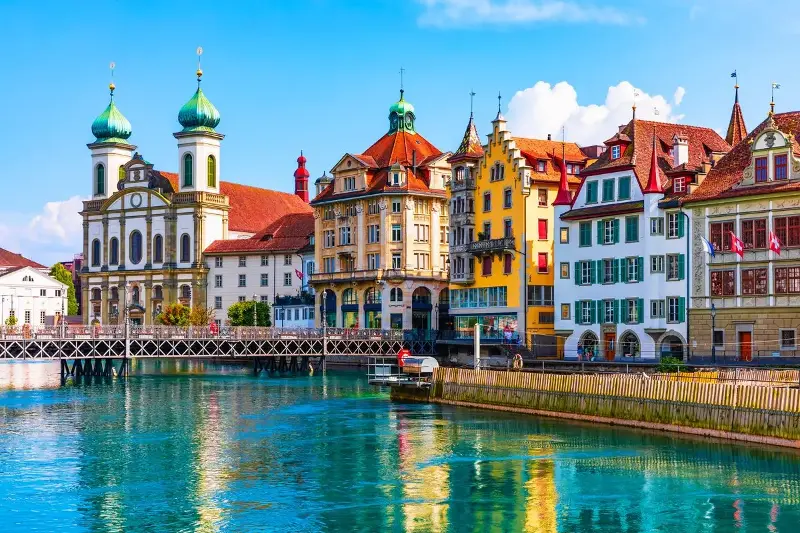
After a three-year wait, the Women’s Euros Championship is back, and this time, Switzerland will be hosting the female football teams in eight different stadiums across the country.
Back in 2022, England hosted the games after a delay due to Covid, seeing the Lionesses win their home tournament for the first time in women’s (and men’s) Euros history.
The 2025 championship will kick off on 2 July in the city of Thun, sitting on the banks of a deep blue lake in the heart of the country, with the final then scheduled on 27 July in Basel, which has just hosted the Eurovision Song Contest.
Throughout the month, matches will be held in some of Switzerland’s most breathtaking destinations, from the chocolate artisan haven of Geneva to the town of Sion tucked away in the Rhone Valley between the snowcapped Swiss Alps.
Most locations have charming Old Towns, peppered with sandstone medieval landmarks and red-tiled timber houses lining the banks of rivers or at the mouth of some of the country’s most magnificent lakes.
If you are heading to Switzerland for the Euros, or are inspired to book a trip to the host cities later in the year, take a look at our guide to where the matches will take place this year, as well as a recommendation on where to stay.
EUFA Women’s Euro host cities 2025
1. Basel
Stadium: St. Jakob-Park
It seems that 2025 has been Basel’s year. Coming off the back of hosting Eurovision, the city will now welcome teams from around the continent for the Women’s Euros next month. Tucked between the borders of France and Germany, Switzerland’s third most populous city sits in the northwest region of the country on the river Rhine, where its picture-book half-timbered buildings line the water, with the red sandstone Basler Münster cathedral towering above. Aside from Basel’s charming Old Town, the city is known for having a high volume of galleries and museums held up by an internationally-renowned arts scene. Some highlights include the eclectic sculpture collection in Museum Tinguely, while Kunstmuseum Basel houses the oldest public art collection in the world.
As the days start to get warmer, the Rhine will fill with locals bobbing along with colourful Wickelfisch (a fish-shaped dry bag holding belongings) in tow. River swimming, as well as bathing in one of the many hundreds of fountains in Basel, is a long-standing ritual as the summer months arrive.
Where to stay
For an option not far from St. Jakob-Park, Gaia Hotel has 86 hotel rooms that include access to its Finnish sauna and hydrotherapy pool. The hotel has a focus on sustainability, using a zero-waste strategy and organic products in its ‘Bio Breakfast’.
Read more: Basel city guide - where to stay, eat, drink and shop in Switzerland’s Eurovision host city
2. Bern
Stadium: Stadion Wankdorf
The city of Bern is hailed as one of Switzerland’s most beautiful, with its Unesco-listed Old Town filled with sandstone architecture, cobbled alleyways and the famous Zytglogge medieval astronomical clock tower. One of the city’s most unusual attractions is its bear ‘pit’, where brown bears roam around in a park on the banks of the Aare. Bern has a long history with bears, having roamed the area before the city was established, and are now the city’s heraldic animal. Since 2009, the Bernese bears moved out of their old pit and have continued to live in a 6,000-square-metre park, which guests can tour to get a little closer to the furry mammals.
When not exploring medieval architecture in the Old Town or stopping to visit its resident bears, tourists find themselves checking out Parliament House, the centre of Swiss democracy, or taking it easy in Bern’s green spaces, such as the flower-filled Rose Garden.
Where to stay
To stay near Stadion Wankdorf, a short bus ride from the city centre, the Moxy Bern Expo has twin, queen-bed and family rooms, with an on-site fitness centre and a casual breakfast bar to grab a quick bite to eat before heading to the match.
Read more: The most underrated spots to visit for anyone inspired by Eurovision’s host country
3. Geneva
Stadium: Stade de Genève
When thinking of Geneva, it’s entirely possible that international diplomacy hubs and United Nations’ offices will spring to mind over tourist sights. And while it may not be up there with some of Europe’s most visited cities, Geneva attracts travellers who want to sink their teeth into something sweet. The city offers a ‘Choco Pass’, which guides visitors through a series of chocolatiers serving up tasters of Pavés de Genève, a little cube of chocolate dusted in cocoa powder, and other confectionaries as you go along. Some of Switzerland’s historic family chocolate establishments originated in Geneva, such as Rohr, which is the only company to still produce Pavés de Genève by hand according to an original recipe. The chocolate artisans can be found in the city centre near the Rhône river, which flows into the magnificent Lake Geneva.
After a stroll around Geneva’s charming Old Town, take a boat tour out onto the lake for a close up view of the bright blue waters and the Jet d’Eau, a fountain in the harbour that shoots water 140 metres into the air, and has become a popular selfie opportunity as it sprays up into the sky.
Read more: Why you should swap the heat of the Mediterranean for a summer holiday in Switzerland
Where to stay
Geneva has some magnificent five-star options such asWhy you should visit the chocolate-box Swiss town that most tourists miss
© Independent Digital News & Media Ltd
